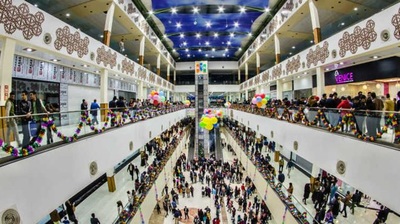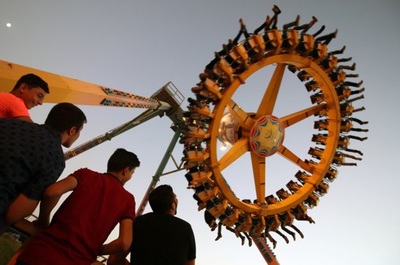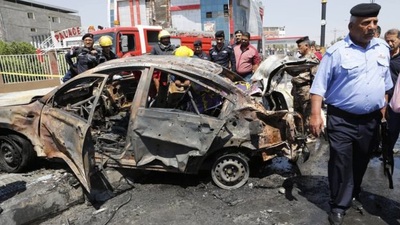A quick security check and we enter a world far removed from the conventional image of Iraq - a world whose promoters invite you to "make yourself happy", where "shopping shouldn't be seen as a task or chore, but rather an experience to be enjoyed".
Inside, the mall is as light, bright and spacious as any in the West. Its four floors are packed with up-market shops and boutiques. There is a Mango fashion store, Sony and Samsung outlets, a cosmetics shop selling Lancome and Max Factor, various pizza and American-style fast food joints, even an Italian ice-cream parlour.
But more surprising than the shops are the people. They are pouring in, many hundreds of them - men and women, young and old, parents with small children and babies in pushchairs. One young woman tells me that the mall has usurped Basra's tired old funfair.
The restrictions on dress and behaviour so strictly applied on the streets outside don't seem to apply in here. There is hardly a long black abaya or face-covering niqab in sight. The women wear brightly-coloured clothes. Many have pushed their headscarves well back to expose heavily made up faces and a daring amount of hair.
Some haven't covered their heads at all - following the example perhaps of the female mannequins outside one of the fashion shops. Meanwhile young men with trendy haircuts wander round in nifty suits or T-shirts and tight jeans, eyeing up the female talent.
The usual rigid segregation of the sexes seems to have broken down as well. Some shops are selling both men's and women's clothes. Couples walk round hand-in-hand - a few of them look far too young to be married.
At one point, a group of students dressed in white puts on a show in the ground-floor foyer. As they sing and dance a large crowd gather round them, and other shoppers rush to watch from the balconies above. My friend tells me the performance is a protest against all the killings that still happen in Iraq. The throng swells and applauds enthusiastically.
The only guns to be seen inside the mall are on the third floor, where there is a children's shooting range in a mini-funfair. Parents look on as their young offspring squeal with pleasure on the rides and merry-go-rounds. I realise that in many years of visiting Iraq I have rarely seen this before - families enjoying themselves. Fun has long been a commodity in short supply here.
I realise also that I'm witnessing something quite profound. This is more than just a shopping mall. It is a temple of tolerance, a public space where Iraqis - especially young Iraqis - can relax and feel free, a riposte to the joyless zealots who would control every aspect of their lives. "It makes us feel part of the wider world," one woman tells me.
I suggest to my Iraqi friend that, ultimately, this symbol of western consumerism could pose a much greater threat to Basra's religious reactionaries than the British military ever did. He thinks for a moment, then concurs. "This is the wave of the future," he says. "It can't be resisted."
Source http://www.bbc.co.uk/news/magazine-36532435





 RSS Feed
RSS Feed